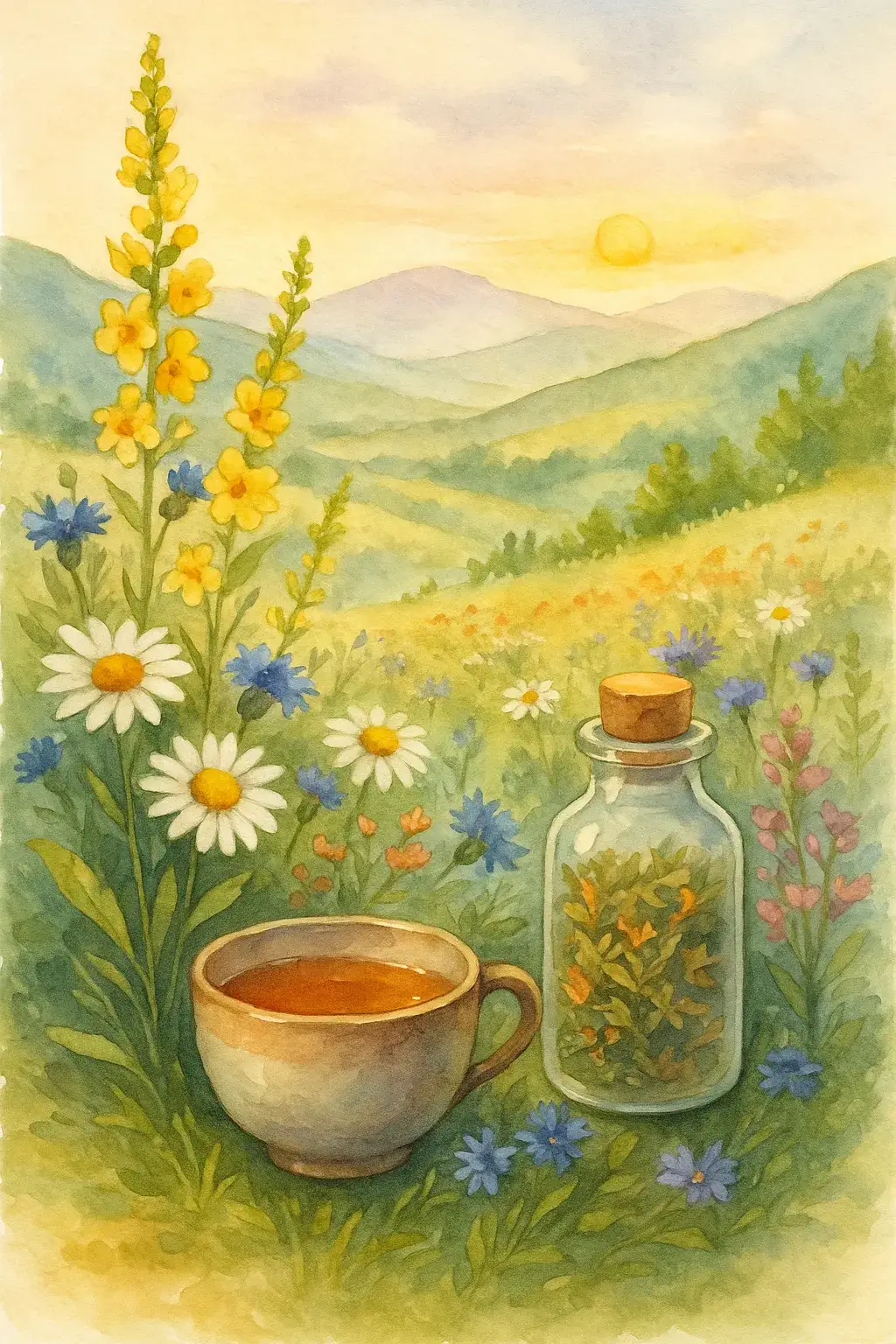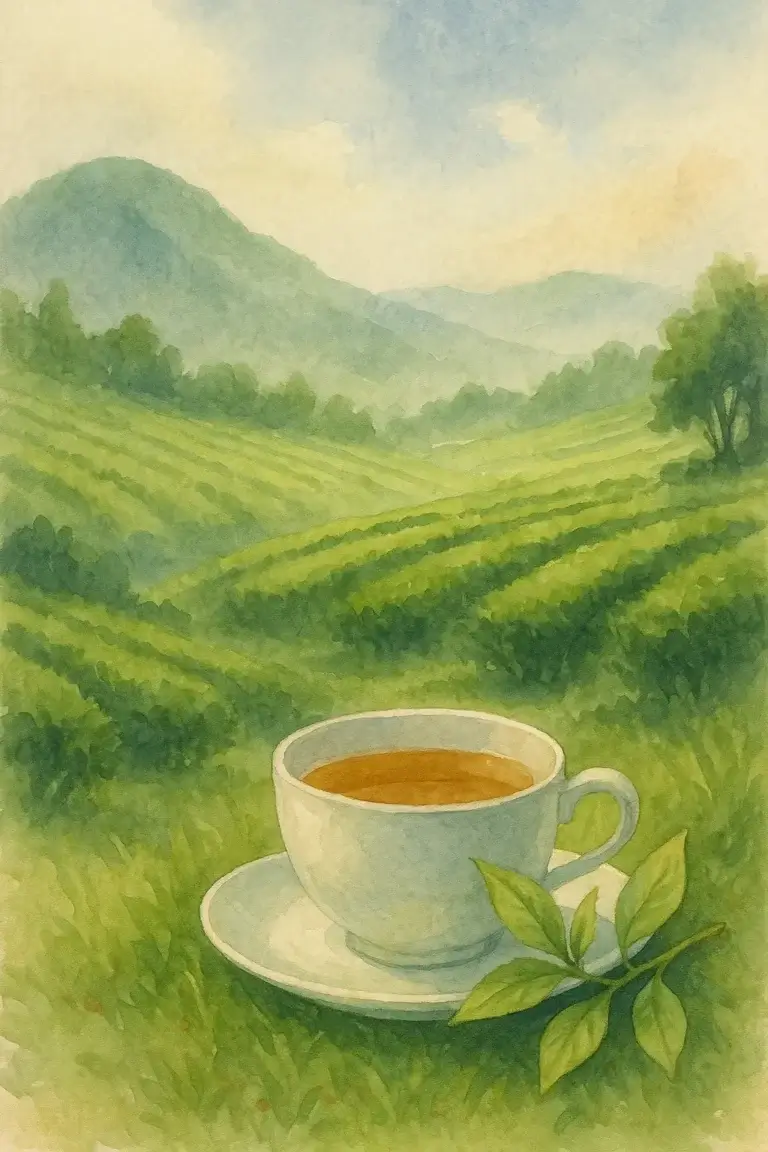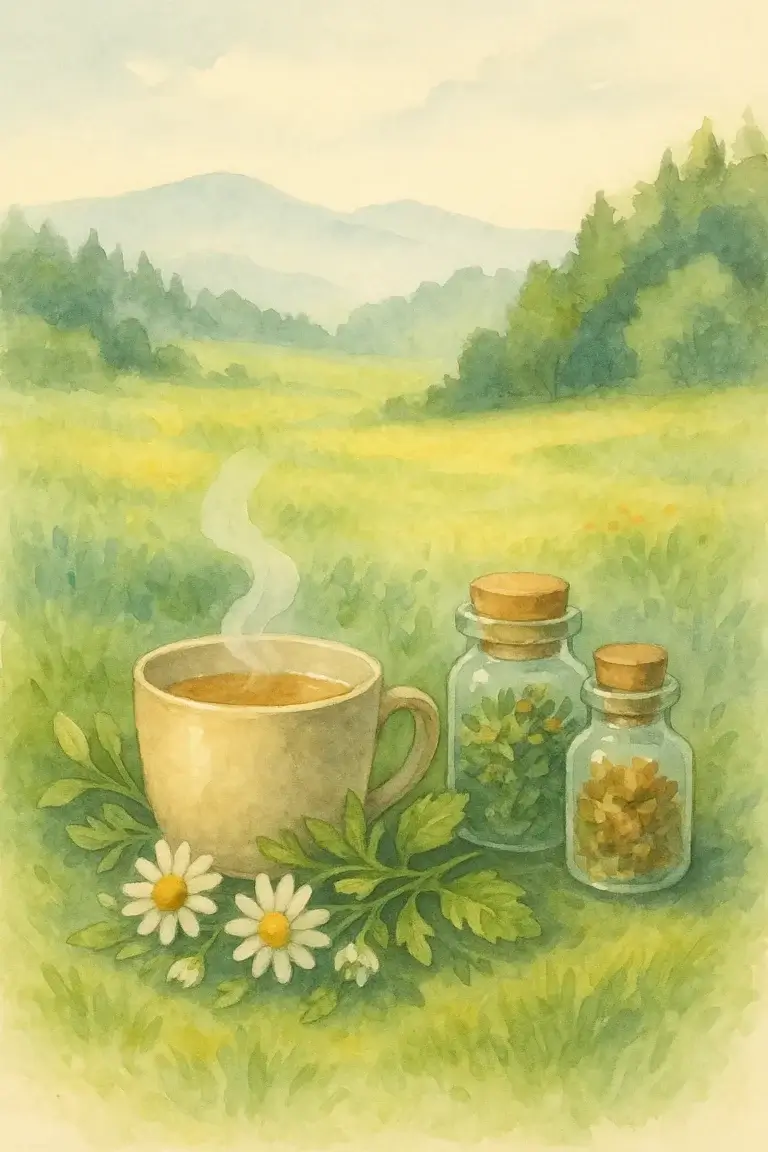Wildflower Infusions: Soothing Tea Blends for Digestive Comfort

Wildflower Digestive Tea: 5 Soothing Blends for Gut Comfort & Harmony
Nature’s wildflower meadows offer more than beauty—they hold a treasure trove of gentle digestive allies. For centuries, traditional medicine systems have revered these vibrant botanicals for their remarkable ability to soothe and balance the digestive system. In this comprehensive guide, you’ll learn how to identify, ethically harvest (if applicable), expertly blend, and perfectly brew five signature **Wildflower Digestive Tea** infusions. Each blend is meticulously designed to target specific digestive challenges, from common gas and bloating to low appetite and persistent indigestion. We’ll delve deep into the phytochemistry of these remarkable plants, explore precise preparation techniques, establish effective dosing schedules, and provide bonus “harvesting tips” so you can confidently create these healing blends, either fresh from the meadow or from high-quality dried botanicals, right in your own kitchen. Prepare to unlock a world of natural gut comfort and harmony.
Why Wildflower Digestive Tea? The Power of Nature’s Pharmacy
The unassuming beauty of wildflowers belies their profound medicinal potency, particularly for digestive health. Wildflowers such as chamomile, yarrow, calendula, and valerian have evolved complex chemical defenses—a rich array of flavonoids, sesquiterpene lactones, essential oils, and mucilages—that, remarkably, align perfectly with the needs of human digestion. These compounds work synergistically within the body to act on smooth muscle, relieve inflammation, support healthy microbial balance, and promote gentle detoxification pathways. Unlike isolated pharmaceutical extracts, whole-flower and whole-plant blends deliver a broad spectrum of active constituents working in concert, offering a holistic and often gentler approach to digestive wellness. Embracing **Wildflower Digestive Tea** is a return to nature’s original remedies, offering comfort and balance with every sip.
1. Meadow Calm Blend: Your Go-To for Relieving Gas & Bloating
This classic **Wildflower Digestive Tea** blend is specifically formulated to target excess gas, abdominal cramps, and uncomfortable distension by gently relaxing intestinal spasms and promoting healthy, gentle motility. It’s ideal for after-meal discomfort or when you feel a build-up of internal pressure.
- Ingredients (per 1 cup serving):
- 1 teaspoon (approx. 1g) dried Chamomile flowers (Matricaria chamomilla)
- 1 teaspoon (approx. 1.5g) dried Fennel seeds (Foeniculum vulgare), lightly crushed
- ½ teaspoon (approx. 0.5g) dried Yarrow flowers (Achillea millefolium)
- Key Bioactive Compounds & Actions:
- **Apigenin (Chamomile):** A potent flavonoid with strong antispasmodic and anti-inflammatory properties, directly relaxing the smooth muscles of the digestive tract. It also has mild sedative effects, aiding overall relaxation.
- **Anethole (Fennel):** The primary active compound in fennel, known for its carminative properties, meaning it helps expel gas from the intestines and prevents its formation. It also has a sweet, licorice-like flavor that makes the tea pleasant.
- **Chamazulene & Achilleine (Yarrow):** Yarrow contributes anti-inflammatory actions and mild bitter compounds that can stimulate digestion. Its historical use as a diaphoretic also helps release trapped heat, beneficial for uncomfortable bloating.
- Preparation:
- Place all dried botanicals into a French press, a large tea infuser, or directly into your mug.
- Pour 250 ml (approx. 1 cup) of near-boiling water (around 95°C / 203°F) over the herbs.
- Cover tightly to prevent the volatile essential oils from escaping, and steep for 10–12 minutes. For a stronger effect, steep for up to 15 minutes.
- Press down the plunger or strain the tea thoroughly, ensuring no small particles remain. Sip slowly over 10-15 minutes, allowing your body to relax and the herbs to work.
- Dosing & Best Practices:
- Take one cup immediately after a substantial lunch, especially if you anticipate gas or bloating.
- Repeat 30 minutes post-dinner if needed, particularly before bed to ensure a comfortable night’s sleep.
- **Important:** Avoid more than two cups of this blend per day, as excessive yarrow may have mild diuretic effects for some sensitive individuals.
2. Sunrise Gentle Appetite Tonic: Revitalizing Your Morning
This warming, gently bitter-forward **Wildflower Digestive Tea** infusion is designed to stimulate a healthy morning appetite and prime your entire digestive system for the day ahead. It’s perfect for those who struggle with morning sluggishness or a low desire to eat breakfast.
- Ingredients (per 1 cup serving):
- 1 teaspoon (approx. 2g) dried Dandelion root (Taraxacum officinale), roasted or cut and sifted
- ½ teaspoon (approx. 0.5g) dried Calendula petals (Calendula officinalis)
- ¼ teaspoon (approx. 0.2g) dried Peppermint leaves (Mentha piperita)
- Pinch of organic citrus zest (orange or lemon), freshly grated if possible
- Key Bioactive Compounds & Actions:
- **Taraxacin & Inulin (Dandelion Root):** Dandelion is a renowned bitter tonic. Taraxacin stimulates bile flow from the liver and gallbladder, crucial for fat digestion and nutrient absorption. Inulin, a prebiotic fiber, supports a healthy gut microbiome. Roasted dandelion root also offers a pleasant, coffee-like flavor.
- **Triterpenes & Flavonoids (Calendula):** Calendula is a gentle vulnerary (wound-healing) and anti-inflammatory herb. Its compounds soothe and protect irritated mucous membranes throughout the digestive tract, making it excellent for sensitive stomachs.
- **Menthol (Peppermint):** Peppermint adds a refreshing aroma and has mild warming and relaxing properties for the gut muscles. It can also help alleviate mild nausea and stimulate appetite.
- Preparation:
- Place the dried dandelion root in a small saucepan with 200 ml (approx. ¾ cup) of filtered water. Bring to a gentle simmer for 5 minutes. This decoction process is necessary to extract compounds from the denser root.
- Remove from heat, then add the calendula petals and peppermint leaves. Cover the saucepan tightly to steep for an additional 8 minutes.
- Strain the infusion into your favorite mug. Garnish with a pinch of fresh citrus zest for added aroma and a burst of flavor.
- Dosing & Best Practices:
- Sip 150 ml on an empty stomach, ideally 20 minutes before breakfast. This allows the bitter compounds to prime your digestive secretions before you eat.
- Limit intake to one cup per day to avoid overstimulation of bile, which can occur with excessive bitter tonic use, especially if you have a sensitive gallbladder.
3. Afternoon Reset: Cooling Digestive Balance for Heartburn & Heat
This unique **Wildflower Digestive Tea** blend offers a cool-toned, soothing effect, perfect for counteracting midday heat, acidity, or that uncomfortable sensation of heartburn. It features demulcent and alkalizing wildflowers that provide a protective layer to irritated mucous membranes.
- Ingredients (per 1 small jug / approx. 2 servings):
- 1 tablespoon (approx. 5g) dried Marshmallow root (Althaea officinalis)
- 1 tablespoon (approx. 3g) dried Plantain leaf (Plantago major/lanceolata)
- 1 teaspoon (approx. 1g) dried Lemon balm (Melissa officinalis)
- 2 cups (approx. 500 ml) cold filtered water
- Key Bioactive Compounds & Actions:
- **Mucilage Polysaccharides (Marshmallow Root):** Marshmallow root is a quintessential demulcent. Its mucilage forms a protective, gel-like layer over irritated mucous membranes, reducing inflammation and acting as a barrier against stomach acid, making it excellent for heartburn and gastritis.
- **Aucubin & Polysaccharides (Plantain Leaf):** Plantain is another fantastic demulcent and vulnerary. It contributes anti-inflammatory properties and helps to heal damaged tissues in the digestive tract, while its gentle astringency can help tighten and tone inflamed membranes.
- **Rosmarinic Acid & Terpenes (Lemon Balm):** Lemon balm adds a refreshing citrus note and contributes its renowned calming properties. It’s excellent for reducing stress-related digestive upset and has mild antispasmodic effects, further supporting balance.
- Preparation (Cold Maceration):
- Combine all dried botanicals and the cold filtered water in a clean glass jar (e.g., a quart-sized Mason jar).
- Cover the jar tightly and place it in the refrigerator for 4–6 hours, or ideally overnight. Cold maceration is crucial for extracting the beneficial mucilage from marshmallow root without making it gummy.
- Strain the infusion through a fine-mesh sieve or cheesecloth into a pitcher, ensuring all plant material is removed.
- Dosing & Best Practices:
- Drink 150–200 ml (about ¾ to 1 cup) of this chilled **Wildflower Digestive Tea** as needed. It’s particularly ideal for late afternoon or early evening to calm reflux, heartburn, or general heat sensations.
- Consume the entire batch within 24 hours for optimal freshness and potency.
4. Evening Unwind: Valerian & Skullcap for Muscle-Relaxing Tea & Nervous Digestion
This powerful **Wildflower Digestive Tea** is specifically formulated to help you wind down from daily stress, release digestive tension, and alleviate nervous indigestion that often interferes with restful sleep. It’s a perfect addition to your evening ritual for deep calm.
- Ingredients (per 1 cup serving):
- 1 teaspoon (approx. 1.5g) dried Valerian root (Valeriana officinalis)
- 1 teaspoon (approx. 1g) dried Skullcap (Scutellaria lateriflora)
- 1 teaspoon (approx. 1g) dried Lemon balm (Melissa officinalis)
- Key Bioactive Compounds & Actions:
- **Valerenic Acids (Valerian Root):** Valerian is widely recognized for its sedative and anxiolytic (anti-anxiety) properties. Valerenic acids are believed to modulate GABA receptors in the brain, leading to muscle relaxation and reduced nervous tension, which directly impacts gut spasms caused by stress.
- **Baicalin & Scutellarin (Skullcap):** Skullcap is a gentle nervine, excellent for easing nervous tension, mild anxiety, and restlessness. Its flavonoids, particularly baicalin, offer mild antispasmodic action, making it ideal for the “nervous stomach” often experienced before sleep.
- **Rosmarinic Acid (Lemon Balm):** Lemon balm complements the sedative effects of valerian and skullcap, adding another layer of calming action. It helps soothe an overactive digestive system driven by stress and provides a pleasant, uplifting aroma.
- Preparation:
- Begin by placing the valerian root and skullcap in a small saucepan with 200 ml (approx. ¾ cup) of water. Simmer gently for 5 minutes. As with dandelion root, a short decoction helps extract the medicinal compounds from these denser plant parts.
- Remove the saucepan from heat. Add the dried lemon balm, cover tightly, and steep for an additional 8–10 minutes.
- Strain the tea very well to remove all plant sediment, ensuring a smooth sip.
- Dosing & Best Practices:
- Sip 100–150 ml (about ½ to ¾ cup) of this warming **Wildflower Digestive Tea** approximately 30–45 minutes before bedtime. This allows the calming effects to begin before you settle in for the night.
- **Caution:** Limit to one cup nightly. Due to valerian’s sedative properties, avoid consuming this tea if you need to operate heavy machinery or drive soon after.
5. Seasonal Adaptation: Bee Balm & Rose Petals for Immuno-Digestive Support
This aromatic and visually appealing **Wildflower Digestive Tea** blend combines beautiful top notes with gentle digestive relief and mild immune support, making it ideal during seasonal transitions or when you need a gentle pick-me-up.
- Ingredients (per 1 cup serving):
- 1 teaspoon (approx. 0.8g) dried Bee Balm (Monarda fistulosa) – also known as Wild Bergamot
- 1 teaspoon (approx. 0.5g) dried Rose petals (Rosa damascena / gallica) – ensure organic, food-grade quality
- ½ teaspoon (approx. 0.3g) dried Elderflower blossoms (Sambucus nigra)
- Key Bioactive Compounds & Actions:
- **Thymol & Carvacrol (Bee Balm):** Bee balm is rich in aromatic essential oils, particularly thymol, which offers notable antimicrobial, antiseptic, and carminative actions. This makes it beneficial for minor digestive infections or imbalances.
- **Flavonoids & Anthocyanins (Rose Petals):** Rose petals are gentle astringents and anti-inflammatory agents. Their flavonoids support mucosal health and can help soothe irritated digestive tissues. They also add a beautiful aroma and a touch of sweetness.
- **Flavonoids & Phenolic Acids (Elderflower):** Elderflower is a classic immune-supportive herb, known for its antiviral properties. It also has mild diaphoretic and anti-inflammatory effects that can complement digestive comfort during times of mild illness or seasonal changes.
- Preparation:
- Place all dried herbal ingredients in a tea infuser or directly into your mug.
- Pour 250 ml (approx. 1 cup) of near-boiling water (around 95°C / 203°F) over the herbs.
- Cover tightly to retain the delicate aromatic compounds and infuse for 12–15 minutes.
- Strain and enjoy. For an extra touch of elegance, garnish with a few fresh, edible rose petals if desired.
- Dosing & Best Practices:
- Enjoy one cup mid-morning or post-meal, especially during seasonal transitions (e.g., fall or spring) to provide mild immune resilience alongside digestive support.
Harvesting & Storage Tips for Your Wildflower Digestive Tea Botanicals
For those interested in connecting more deeply with nature’s bounty, ethical wild-crafting and proper storage are paramount to preserving the potency of your **Wildflower Digestive Tea** ingredients:
- Wild-Crafting Ethics & Sustainability:
- **Permission & Identification:** Always seek landowner permission before harvesting on private land. Crucially, ensure you can *positively identify* any plant before harvesting or consuming. When in doubt, leave it be. Consult reliable field guides or local herbalists.
- **The 10% Rule:** Harvest no more than 10% of a healthy, abundant wild patch. This ensures the plant population can regenerate and thrive for future harvests and local wildlife.
- **Leave Roots Intact:** Unless you specifically need roots (like dandelion or valerian), always leave the root system intact to allow for perennial regrowth.
- **Avoid Polluted Areas:** Never harvest near roadsides, industrial areas, conventional farms (due to pesticides/herbicides), or any area prone to pollution. Seek out pristine, wild environments.
- **Right Time:** Harvest flowers when they are fully open and dry (after morning dew has evaporated). Roots are best harvested in fall, leaves in spring/early summer.
- Drying Techniques for Potency:
- **Air Drying:** Hang small bundles of herbs upside down in a dark, well-ventilated area with good air circulation. Alternatively, spread individual flowers or leaves on breathable screens or paper trays.
- **Avoid Sunlight:** Direct sunlight can degrade active compounds (like essential oils and flavonoids) and cause the herbs to lose color and potency.
- **Ensure Thorough Drying:** Herbs are fully dry when they are brittle and snap easily. Any remaining moisture can lead to mold.
- Optimal Storage for Longevity:
- **Airtight & Opaque:** Once your herbs are completely crisp, store them in airtight, opaque glass jars or dark metal tins. Light, air, and moisture are the enemies of herbal potency.
- **Cool, Dark Place:** Store jars in a cool, dark cupboard or pantry, away from direct heat sources (like stoves) or sunlight.
- **Labeling:** Always label your jars with the herb name, date of harvest/purchase, and ideally, the location of harvest.
- **Shelf Life:** Most properly dried and stored herbs retain their peak potency for about one year. After that, they may still be used, but their strength will gradually diminish.
By following these guidelines, you ensure that the **Wildflower Digestive Tea** you craft retains its vibrant therapeutic properties, connecting you more deeply with the healing power of nature.
Tracking Your Herbal Journey: Your Personal Wildflower Digestive Tea Log
To truly understand how these **Wildflower Digestive Tea** blends impact your unique body, consistent tracking is key. A simple log can provide invaluable insights, helping you refine your blends and discover what works best for your digestive comfort:
- Date & Time of Each Infusion: Record the exact time you prepared and consumed each cup of **Wildflower Digestive Tea**. Why Track: This helps identify if certain blends are more effective at specific times of day (e.g., morning for appetite, evening for relaxation).
- Herbs and Ratios Used: Be precise about the type and quantity of each herb in your blend (e.g., “Meadow Calm: 1 tsp Chamomile, 1 tsp Fennel, 0.5 tsp Yarrow”). Why Track: This allows you to experiment with slight adjustments and pinpoint the exact combinations that yield the best results for you.
- Digestive Sensations (1–10 Scale): Rate your digestive comfort (e.g., bloating, cramps, gas, heartburn, regularity) on a scale of 1 to 10 *before* drinking the tea and again approximately 30 minutes *after* consumption.
- 1 = Severe discomfort
- 5 = Moderate, manageable issues
- 10 = Completely comfortable, no issues
- Energy/Mood Notes: Add a brief note about your overall energy levels and mood (e.g., “feeling light and energized,” “relaxed and calm,” “slight tension in gut,” “noticeably less irritable”). Why Track: Digestive health is intimately linked to energy and mood via the gut-brain axis. Tracking these broader effects gives you a more holistic view of the tea’s benefits.
Reviewing these patterns weekly helps you discover which **Wildflower Digestive Tea** infusions truly deliver your best digestive comfort and overall well-being. This personalized data will become your most valuable guide on your herbal healing journey.
Safety & Contraindications: Important Notes for Your Wildflower Digestive Tea
While **Wildflower Digestive Tea** blends are generally gentle and safe, it is crucial to approach herbal remedies with awareness, especially if you have existing health conditions or are on medications. Always prioritize your safety and consult with a healthcare professional when in doubt:
- General Caution for Specific Groups:
- **Pregnancy & Nursing:** Many herbs are not adequately studied for safety during pregnancy or lactation. As a general rule, consult a qualified healthcare provider (e.g., your OB/GYN, a clinical herbalist experienced in maternal health) before consuming any new herbal teas if you are pregnant or nursing.
- **Prescription Medications:** Herbal compounds can interact with pharmaceuticals. If you are on any prescription medications (e.g., blood thinners, sedatives, diabetes medications, heart medications), it is essential to discuss the inclusion of any new herbal regimen, including **Wildflower Digestive Tea**, with your physician or pharmacist.
- **Underlying Health Conditions:** Individuals with severe liver disease, kidney disease, autoimmune conditions, or any chronic illness should always seek medical advice before beginning new herbal remedies.
- Specific Herb Cautions:
- **Valerian Root:** As noted, valerian has sedative properties. **Avoid operating heavy machinery or driving** soon after consuming the Evening Unwind blend. It can also interact with other sedatives (e.g., benzodiazepines, alcohol) and anesthetics. Inform your doctor if you are undergoing surgery.
- **Bee Balm (Monarda fistulosa):** While generally safe, some individuals with severe allergies to ragweed or other plants in the Lamiaceae (mint) family may experience cross-reactivity. If you have known allergies, proceed with caution, or consider allergy testing before regular consumption.
- **Dandelion Root:** While generally very safe, dandelion can have a diuretic effect and may interact with diuretic medications. Individuals with gallstones should use bitter herbs like dandelion cautiously, as they stimulate bile flow.
- **Fennel Seeds:** Generally well-tolerated, but high doses can have mild estrogenic effects, which may be a concern for individuals with hormone-sensitive conditions. Used in small amounts in the Meadow Calm blend, this is unlikely to be an issue.
- Allergic Reactions:
- Always perform a patch test or consume a very small amount first if you are prone to allergies or are trying a new herb. Discontinue use immediately if you experience itching, swelling, rash, or difficulty breathing.
By keeping these safety considerations in mind, you can confidently and responsibly integrate the power of **Wildflower Digestive Tea** into your wellness routine, ensuring it remains a beneficial and harmonious addition to your health journey.
Frequently Asked Questions (FAQs) About Wildflower Digestive Tea
To further support your journey with these healing infusions, here are answers to some common questions about **Wildflower Digestive Tea**:
- Q: Can I use fresh wildflowers instead of dried ones?
A: Absolutely! Fresh herbs often contain a higher concentration of volatile oils and offer a more vibrant flavor. If using fresh, you will generally need to use about 2-3 times the amount listed for dried herbs, as dried herbs are more concentrated. Ensure your fresh herbs are from a clean, unpolluted source and are correctly identified. - Q: Where can I buy high-quality dried wildflowers for tea?
A: Look for reputable organic herbal suppliers online or at local health food stores. Companies specializing in medicinal herbs are often the best choice. Ensure they list the botanical name (e.g., Matricaria chamomilla for chamomile) and specify “food grade” or “culinary” quality. - Q: Are these teas safe for children?
A: Some herbs, like chamomile and lemon balm, are generally considered safe for children in small, diluted amounts. However, always consult a pediatrician or a qualified pediatric herbalist before giving any herbal teas to children, especially those containing stronger herbs like valerian or yarrow. Dosage will also need to be significantly reduced based on age and weight. - Q: Can I combine these blends or add other herbs?
A: These recipes are designed for specific effects, but you can certainly experiment. For example, adding a little lemon balm to the Meadow Calm blend for extra relaxation is fine. However, avoid combining too many strong herbs at once, especially if you are new to herbalism. Introduce changes gradually and monitor your body’s response, always noting it in your log. - Q: How long does it take to experience the benefits of Wildflower Digestive Tea?
A: Acute relief (like from gas or mild indigestion) can often be felt within 30-60 minutes of drinking a tea. For more chronic issues or deeper systemic support, consistent daily use over several weeks (2-4 weeks) is often necessary to observe significant and lasting benefits. Regular use, coupled with dietary and lifestyle adjustments, yields the best long-term results.
Conclusion
By embracing the art of crafting these five **Wildflower Digestive Tea** infusions—each inspired by the healing rhythms and gentle beauty of meadow landscapes—you tap into centuries-old herbal wisdom for modern digestive wellness. Whether you’re easing uncomfortable bloating after meals, stimulating your morning appetite, or calming nighttime tension and nervous indigestion, these thoughtfully designed blends offer a customizable, seasonal approach to soothing digestion naturally. Embrace the mindful process of wild-crafting (if ethically possible), master your brew techniques to extract maximum potency, and diligently journal your results. With practice, patience, and a deeper connection to nature’s pharmacy, you’ll undoubtedly develop your own signature “meadow teas” that keep your gut flowing smoothly, comfortably, and harmoniously through every season of life. Let the wildflowers guide you to a more balanced and vibrant digestive system.
References & Further Reading:
- Srivastava, J. K., Pandey, S., & Gupta, S. (2009). Chamomile, a herbal medicine of the past with bright future. Molecular Medicine Reports, 3(6), 895–901. Source: Chamomile: a herbal medicine of the past with bright future (PubMed)
- Bone, K. (2003). A Clinical Guide to Blending Liquid Herbs: Herbal Formulations for the Practitioner. Churchill Livingstone. (General reference for herbal formulations)
- WebMD. Health Benefits of Chamomile Tea. Accessed June 2025.
- Mayo Clinic. Herbal Supplements: What to Know Before You Try. Accessed June 2025.
- For more natural remedies, visit our Natural Remedies Collection.
- Discover other gut-healing recipes: Gut Health Recipes.


